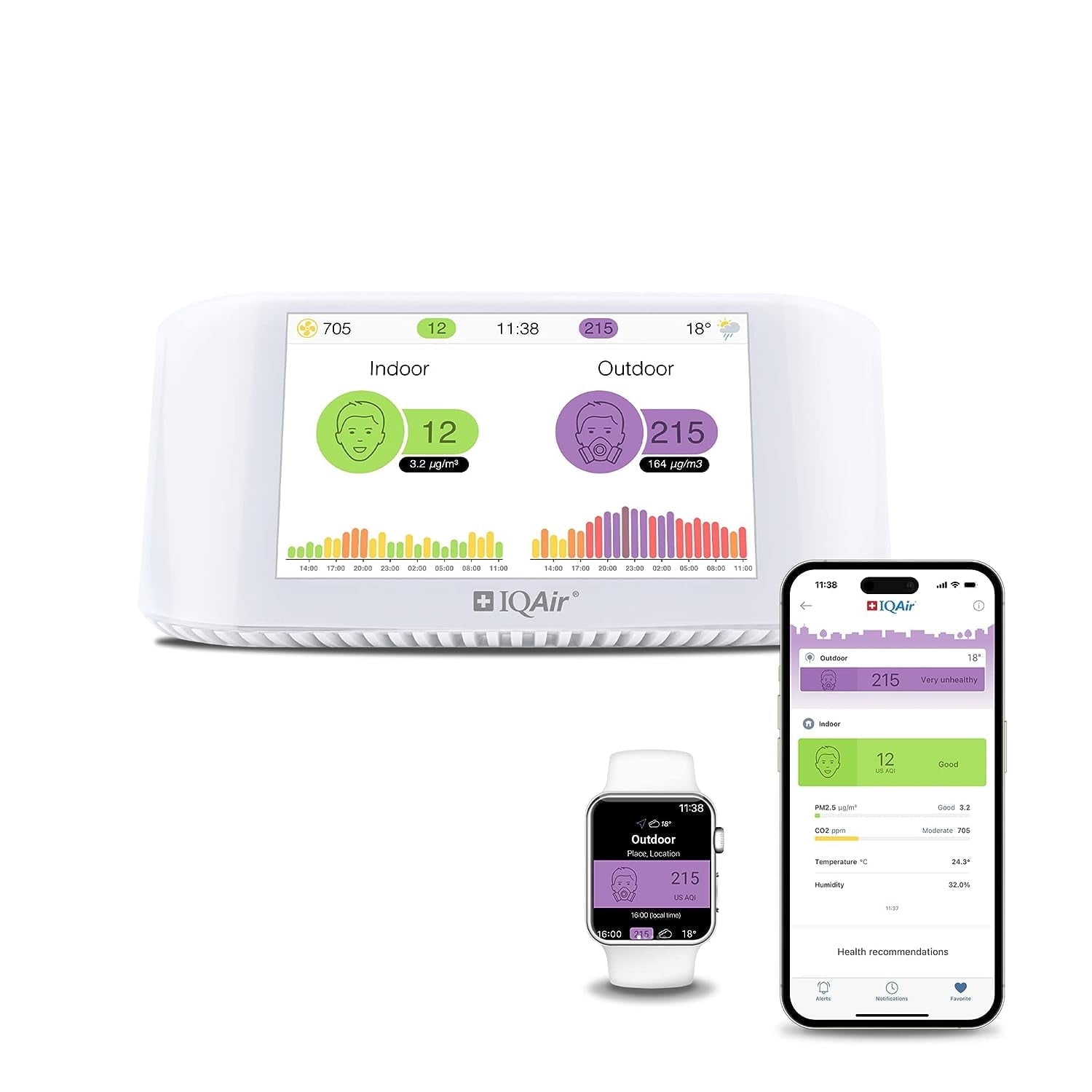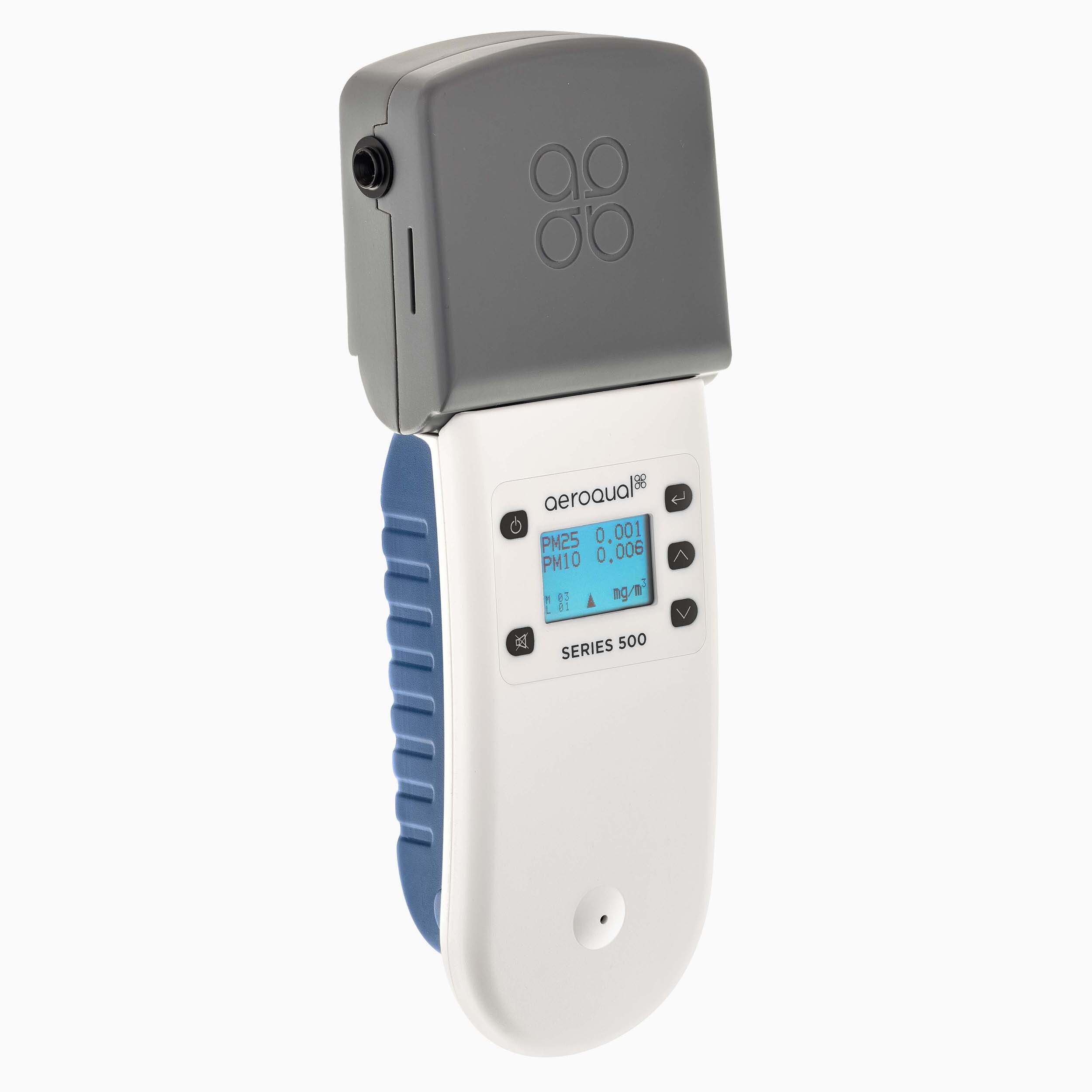Por un escritor de hombre misterioso

This PM 2.5 Indoor Air Quality Monitor is equipped with an instant measurement PM 2.5, and also measures ambient humidity and temperature. Plus, with its WiFi feature, you can access real-time and historical data of PM 2.5 readings from your iOS or Android smart phone app. One simple button on the top allows for easy o
This PM 2.5 Indoor Air Quality Monitor is equipped with an instant measurement PM 2.5, and also measures ambient humidity and temperature.
Plus, with its WiFi feature, you can access real-time and historical data of PM 2.5 readings from your iOS or Android smart phone app. One simple button on the top allows for easy operation, switching between functions like US AQI or CN AQI.
PM 2.5 refers to particulate matter (PM) that has a diameter of 2.5 micrometers or smaller. These tiny particles are a subset of the larger category of particulate matter, which includes a wide range of solid and liquid particles suspended in the air.
PM 2.5 particles are very small and can remain airborne for extended periods, allowing them to be easily inhaled into the lungs. Due to their small size, they can penetrate deep into the respiratory system and even enter the bloodstream. This makes PM 2.5 a significant public health concern.
The primary sources of PM 2.5 include:
Combustion of fossil fuels: Emissions from vehicles, power plants, and industrial processes that burn coal, oil, and gas.
Residential heating and cooking: Wood-burning stoves, fireplaces, and cooking can release PM 2.5 particles.
Agricultural activities: Plowing, tilling, and crop burning can contribute to PM 2.5 emissions.
Wildfires: Smoke from forest fires can release large amounts of PM 2.5 into the atmosphere.
Industrial processes: Various industrial activities can generate PM 2.5 particles as by-products.
Exposure to PM 2.5 has been linked to numerous health problems, particularly respiratory and cardiovascular diseases. Vulnerable groups such as children, the elderly, and individuals with pre-existing health conditions are at higher risk. In response to these health concerns, many countries have set air quality standards and regulations to limit PM 2.5 concentrations in the atmosphere and protect public health.
Specifications
Lookup Table for AQI and PM2.5 Value
Air Quality Index
(AQI)
Corresponding PM2.5
Concentration
Air Pollution
Level for Health
Color Code
CN
standard
US
standard
0~50
0~35
0~12
Level 1
(Excellent)
Green
51~100
36~75
13~35
Level 2
(Good)
Yellow
101~150
76~115
36-55
Level 3
(Lightly Polluted)
Orange
151~200
116~150
56~150
Level 4
(Moderately Polluted)
Red
201~300
151~250
151~250
Level 5
(Heavily Polluted)
Purple
301~500
251~500
251~500
Level 6
(Severely Polluted)
Maroon
This PM 2.5 Indoor Air Quality Monitor is equipped with an instant measurement PM 2.5, and also measures ambient humidity and temperature.
Plus, with its WiFi feature, you can access real-time and historical data of PM 2.5 readings from your iOS or Android smart phone app. One simple button on the top allows for easy operation, switching between functions like US AQI or CN AQI.
PM 2.5 refers to particulate matter (PM) that has a diameter of 2.5 micrometers or smaller. These tiny particles are a subset of the larger category of particulate matter, which includes a wide range of solid and liquid particles suspended in the air.
PM 2.5 particles are very small and can remain airborne for extended periods, allowing them to be easily inhaled into the lungs. Due to their small size, they can penetrate deep into the respiratory system and even enter the bloodstream. This makes PM 2.5 a significant public health concern.
The primary sources of PM 2.5 include:
- Combustion of fossil fuels: Emissions from vehicles, power plants, and industrial processes that burn coal, oil, and gas.
- Residential heating and cooking: Wood-burning stoves, fireplaces, and cooking can release PM 2.5 particles.
- Agricultural activities: Plowing, tilling, and crop burning can contribute to PM 2.5 emissions.
- Wildfires: Smoke from forest fires can release large amounts of PM 2.5 into the atmosphere.
- Industrial processes: Various industrial activities can generate PM 2.5 particles as by-products.
Exposure to PM 2.5 has been linked to numerous health problems, particularly respiratory and cardiovascular diseases. Vulnerable groups such as children, the elderly, and individuals with pre-existing health conditions are at higher risk. In response to these health concerns, many countries have set air quality standards and regulations to limit PM 2.5 concentrations in the atmosphere and protect public health.
Specifications
Lookup Table for AQI and PM2.5 Value
|
Air Quality Index (AQI) |
Corresponding PM2.5 Concentration |
Air Pollution Level for Health |
Color Code |
|
|
CN standard |
US standard |
|||
|
0~50 |
0~35 |
0~12 |
Level 1 (Excellent) |
Green |
|
51~100 |
36~75 |
13~35 |
Level 2 (Good) |
Yellow |
|
101~150 |
76~115 |
36-55 |
Level 3 (Lightly Polluted) |
Orange |
|
151~200 |
116~150 |
56~150 |
Level 4 (Moderately Polluted) |
Red |
|
201~300 |
151~250 |
151~250 |
Level 5 (Heavily Polluted) |
Purple |
|
301~500 |
251~500 |
251~500 |
Level 6 (Severely Polluted) |
Maroon |

Indoor Air Quality Monitor – Sper Scientific Direct

Indoor Air Quality – Sper Scientific Direct

Indoor Air Quality Monitor for PM 2.5 LFF Portable Professional Tester Sensor Meter Detector Temperature Humidity Real Time Color Display for Home,Office,Hotel,Car

Multi-Function Indoor Air Quality Monitor with WIFI - Monitors CO2, PM – Sper Scientific Direct

Simbow Indoor Air Quality Monitor Detect PM2.5, PM10, AQI, CO2, Temperature, and Humidity,CO2 Monitor Build-in High Precision NDIR & Particle Sensor: : Industrial & Scientific

Portable Particulate Monitor - Measure PM2.5 / PM10

Datalogging Indoor Air Quality Meter – Sper Scientific Direct

Indoor Air Quality Monitor with Air Quality Index, PM2.5, PM10, PM1.0, – Sper Scientific Direct

Indoor Air Quality – Sper Scientific Direct
The Multi IAQ Monitor is a professional-grade meter that takes five simultaneous measurements of air quality, including: CO2, PM2.5, PM10,

Multi IAQ Monitor

temperature monitor - Sper Scientific Direct
Continually Monitors Indoor Air Quality (IAQ) for Home and Office. Poor air quality may cause tiredness, inability to concentrate, and even illness

Indoor Air Quality Monitor with Color Coded Display
Large display continually monitors the primary IAQ (Indoor Air Quality) parameters: Air Temperature RH CO 2 Poor air quality may cause tiredness, inability to concentrate, and even illness (i.e., Sick Building Syndrome). This instrument is ideal for monitoring indoor air quality in crowded public spaces with potentially high levels of CO 2 (carbon dioxide) such as offices, factories, classrooms, hospitals and hotels.

Sper Scientific 800048 Indoor Air Quality Monitor